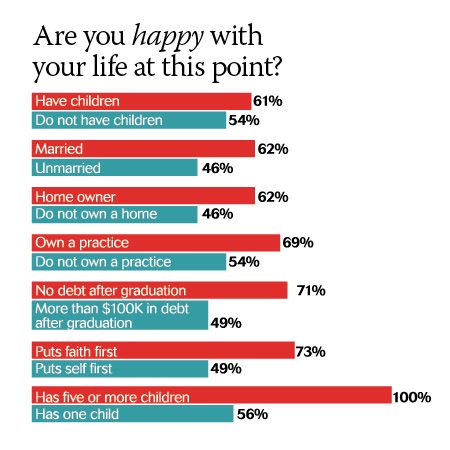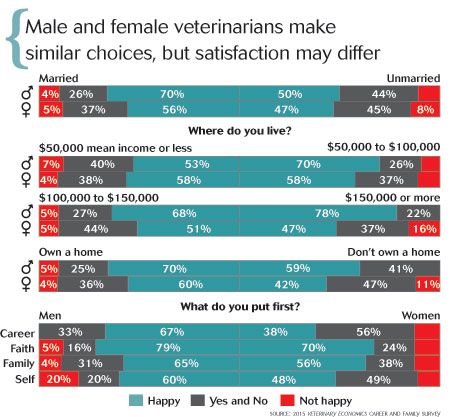Are you happy?
A first look at the 2015 Veterinary Economics Career and Family Survey examines how veterinarians personal choices correspond to overall happiness.
When Eden Myers, DVM, and Ryan Gates, DVM-contributors to the veterinary blog JustVetData.com-asked themselves what they wanted to know about veterinarians, the answer was obvious: What impact do our personal choices have on our careers, and what impact do our career choices have on us personally?

?Veterinarians shared their personal choices-of those, we took a look at who identified as happy.
What happened?
The 2015 Veterinary Economics Career and Family Survey was open for three months and distributed via social media, online discussion groups, online discussion listservs and several allied organizations and state veterinary medical association memberships.
“We ended up with 741 remarkably complete, usable responses,” Myers says. Questions covered the gamut-from basic demographics and veterinary school affiliation to marriage, children, home ownership and debt load.
What do we know?
Results from the survey-and further analysis-will filter out during the coming months from JustVetData.com, Veterinary Economics and dvm360.com. We thought we'd start with happiness.
The majority of veterinarians who responded to the survey and also answered the question (655 respondents)-“Are you happy with how your life has turned out at this point?”-identified themselves as happy. Their other choices were “No” and “Yes and no.” We found that regardless of personal choices (Married? Employed? Kids?), 5 percent consistently reported as unhappy.
Myers noted that many respondents had mixed feelings-choosing “yes and no” often when answering the “happy question.” With these initial results, she hopes to dig deeper to get to the bottom of what exactly they're veterinarians are happy-or not happy-about. (Maybe their regrets on page 15?) But while mixed feelings abound, there are outliers.
> There was little fluctuation in happiness when applied to the mean income level of the ZIP codes where respondents live. However, 11 percent of those who lived in the area with the highest mean income said they were unhappy. That's more than double those who identified as unhappy living in lower-mean-income areas.
> Veterinarians who said they don't own a home reported as unhappy twice as much as their home-owning counterparts.
> At a time when good self-care is being promoted to improve physical and emotional well-being, those who ranked “self” in their list of priorities ahead of faith, family or career reported as least happiest compared to those with different priorities.
> While debt after graduation didn't seem to affect the amount of veterinarians who said they were unhappy, it definitely affected those who identified as happy-71 percent of those with no debt identified as happy compared to only 49 percent of those whose debt exceeded $100,000.
> Respondents' happiness seemed to increase among those with multiple children. Of the few veterinarians who said they had five or more children, 100 percent said they were happy.

When broken down by gender, male veterinarians were generally happier than female veterinarians. There were many similarities between the sexes, such as the percentage ranking family as a first priority-63 percent of men and 69 percent of women. However, 13 percent of women-more than four-times that of men-reported that they put themselves before their faith, family and career. Yet, 20 percent of men who put themselves first identified as unhappy compared to only 3 percent of women.
Another comparison of note was while 11 percent of women who didn't own a home reported as unhappy, not one non-owning male veterinarian identified as unhappy.
What does it mean?
“This is the kind of data the American Veterinary Medical Association (AVMA) isn't providing for us,” Myers says. “This data is about real people. It can help them make decisions.”
In the end, Myers says when respondents were asked what they would have changed, the same things cropped up in both the unhappy and happy groups-more time at home, more money, less debt, children sooner, children later.
“This has really interesting implications for what we need to do to actually make this career better in terms of outcomes,” Myers says. “Simply asking whether people feel good isn't likely to give actionable information. It'll take asking what people want to change.”









